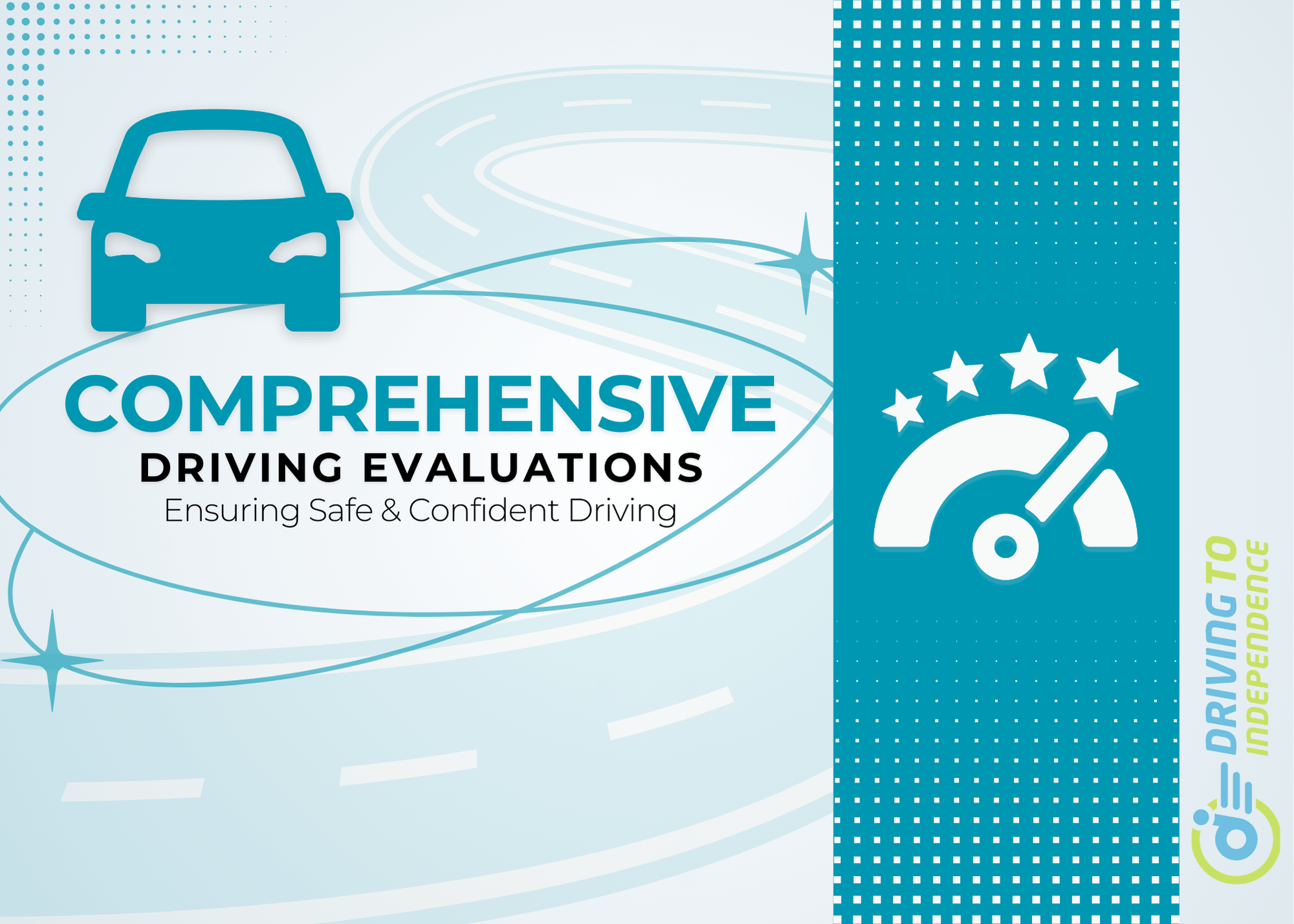
A Comprehensive Driving Evaluation is essential for individuals who have experienced changes in medical conditions, physical abilities, or any other factors that may affect their ability to drive safely. Whether you’re recovering from an injury, experiencing changes in vision, or simply want
to reassess your driving abilities, this evaluation provides a thorough review of your skills and needs behind the wheel.
In this blog, we’ll explore what a Comprehensive Driving Evaluation entails, who can benefit from it, and how it can help ensure your continued driving independence.
What is a Comprehensive Driving Evaluation?
A Comprehensive Driving Evaluation is an in-depth assessment that includes both clinical and on-road evaluations. It is designed to help identify any physical, cognitive, or perceptual changes that may impact your ability to drive safely. This evaluation is not limited to seniors; individuals
of all ages or abilities, including those with disabilities or recovering from medical conditions, can benefit from it.
The assessment typically includes:
- Clinical Assessment: This part of the evaluation consists of various tasks and exercises that assess cognitive abilities, vision, and visual-perceptual skills. It also includes driving pecific tasks, such as reaction time, attention span, and the ability to make safe decisions while driving. For individuals who use wheelchairs or other assistive devices, the evaluation will include tasks related to safely loading and stowing mobility aids in a vehicle.
- On-Road Assessment: The on-road portion is conducted on a standardized route or in a parking lot (for those learning adaptive equipment). During this assessment, the evaluator will observe typical driving maneuvers, such as lane changes, braking, parking, and turning. The purpose is to assess how well the individual can operate a vehicle in real world driving conditions.
Following the evaluation, the driving specialist will provide a recommendation for the individual’s driving safety and ability. If necessary, the evaluation may also suggest adaptive equipment (e.g., hand controls, modified mirrors) or other adjustments to improve safety and comfort.
Why is a Comprehensive Driving Evaluation Important?
A driving evaluation is essential for anyone who may be unsure about their ability to drive or who has experienced changes in their physical or mental abilities. Some of the key benefits of a comprehensive evaluation include:
- Identifying Safety Concerns: The evaluation helps detect any safety risks that may arise from medical conditions, aging, or physical limitations. Early identification can prevent accidents and ensure safe driving practices.
- Personalized Recommendations: Based on the evaluation, the specialist will provide tailored recommendations to address any issues, including whether adaptive equipment or modifications to the vehicle are necessary.
- Boosting Confidence: If you are nervous about driving due to recent changes in your health or abilities, an assessment can help build confidence. Knowing where you stand and what support is available can provide peace of mind.
- Maintaining Independence: A key goal of the evaluation is to help you retain your independence by ensuring that you can continue to drive safely. Whether through the use of adaptive equipment or adjustments to driving habits, an evaluation can help you stay on the road longer.
Who Should Consider a Comprehensive Driving Evaluation?
This evaluation is beneficial for anyone who is experiencing challenges or uncertainties about their ability to drive, including but not limited to:
- Individuals recovering from illness, surgery, or injury: If you’ve experienced a recent change in your physical or cognitive abilities due to illness or injury, a driving assessment can determine if you’re safe to drive or if adjustments are needed.
- People with disabilities: Whether you’re born with a disability or it develops later in life, adaptive driving equipment and strategies can help make driving safer.
- Seniors: Older drivers who may face age-related changes, such as slowed reflexes, vision impairment, or memory loss, can benefit from a comprehensive driving evaluation. (Driving to Independence also offers a Senior Safety Assessment that does not require a medical prescription. This assessment provides a professional opinion on whether driving modifications or adjustments are necessary, helping seniors maintain safe driving habits.)
- Anyone who feels uncertain about their driving abilities: If you’ve been involved in minor accidents, had difficulty navigating certain driving situations, or simply feel unsure about your ability, a driving evaluation can provide the guidance and clarity you need.
How to Prepare for a Comprehensive Driving Evaluation
If you’re planning to undergo a comprehensive driving evaluation, here are some things you should prepare:
- A Doctor’s Prescription: A doctor’s prescription is required for the evaluation, typically stating “Driver’s Evaluation and Training.” This is necessary to ensure that the evaluation aligns with medical recommendations.
- Driver’s License or Learner’s Permit: A valid driver’s license or learner’s permit is needed for the assessment.
- Current Medications: Make sure to bring a list of all medications you’re currently taking, as some medications may affect your driving ability.
Where to Find Comprehensive Driving Evaluations
In New Mexico and Arizona, Driving to Independence offers comprehensive driving evaluations to help individuals of all ages and abilities. We work closely with clients, their physicians, and referring agencies to create a personalized assessment that addresses their specific needs.
If you live outside of New Mexico and Arizona, you can find certified driving rehabilitation specialists through ADED (The Association for Driver Rehabilitation Specialists). They maintain a directory of trained professionals who specialize in comprehensive driving evaluations and can provide the necessary support to help you regain or maintain driving independence.
Conclusion
A comprehensive driving evaluation is a valuable tool for ensuring safe and independent driving. Whether you’re recovering from an injury, managing a disability, or simply want to ensure that you’re fit to drive, this assessment offers valuable insight and guidance. With the support of organizations like Driving to Independence and ADED, individuals can maintain their driving independence and stay safe on the road for years to come.
If you have any questions or need assistance with scheduling an evaluation, don’t hesitate to reach out to Driving to Independence or consult ADED for resources and support.
